The phone rang at three o'clock one morning, while he was screwing an old school pal of Andrea's. The phone was by the bedside. Go on, she said, giggling, answer it. She held onto him while he inched across the bed to the ringing machine. It was his sister Morag ringing to tell him that his mother had died of a stroke an hour before in the Southern General, in Glasgow.
Mrs McLean had to get back home anyway. She left him sitting on the bed, holding his head and thinking. At least it wasn't Dad, and hating himself for thinking it.
He didn't know who to ring. He thought of Stewart, but he didn't want to wake their latest baby; they'd had problems with the kid sleeping anyway. He rang Andrea in Paris. A man answered, and when her sleepy voice came on the phone she hardly seemed to know who he was. He told her he'd had some bad news ... She hung up.
He couldn't believe it. He tried calling back but the phone was engaged; the international operator couldn't get through either. He left the phone on the bed, engaged tone beeping mindlessly while he dressed, then took the Porsche on a long, frosty, starlit drive north, almost to the Cairngorms. Most of the tapes he had in the car at the time were Pete Atkin albums, but Clive James's lyrics were too thoughtful, and often too melancholic, for a good, fast mindless drive, and the reggae tapes he had - mostly Bob Marley - were too laid back. He wished he had some Stones. He found an old tape, one he'd almost forgotten, and turned the Motorola up to maximum volume, playing Rock and Roll Animal over and over, all the way up to Braemar and back, a sort of knowing sneer on his face. 'Allo?' he whined nasally to the headlights of the occasional passing car, 'Allo? Ça va? Allo?'
He went to that place on the way back; he stood under the great red bridge which he had once thought looked the same colour as her hair, while his breath smoked and the Porsche idled clatteringly on the gravel turning circle and the first streaks of dawn outlined the bridge, a silhouette of arrogance, grace and power against the pale flames of a winter morning sky.
The funeral was two days later; he'd stayed with his father in the pebble-dashed council house after quickly packing a bag in his flat and slamming the whining phone down. He ignored his mail. Stewart Mackie came through for the funeral.
Looking down at his mother's coffin he waited for tears that did not come, and put his arm round his father's shoulders, only realising then that the man was thinner and smaller than he used to be, and quietly, steadily quivering, like ajust-struck iron rod.
As they were leaving, Andrea met them at the cemetery gates, getting out of an airport taxi, dressed in black and carrying a small case. He couldn't speak.
She hugged him, talked to his father, then came to him and explained that after they were cut off she'd tried to call him back. She'd been trying for two days; she'd sent telegrams, she'd had people go round to his flat to look for him. In the end, she'd decided to come herself; she'd phoned Morag in Dunfermline as soon as she got off the plane, found out what had happened, and where the funeral was.
All he could say was thank you. He turned to his father and hugged the man, and then cried, crying more tears into his father's coat-collar than he thought his eyes could ever have held; for his mother, for his father, for himself.
She could only stay for one night; she had to go back to study for some exams. The three years had become four. Why didn't he come to Paris? They slept in separate rooms in the pebble-dashed house. His father had been sleepwalking and having nightmares: he would sleep in the same room, to wake his father if he had nightmares, stop him hurting himself if he walked in his sleep.
He drove her through to Edinburgh; they had lunch at her parents', then he took her to the airport. Who was your friend, the one on the phone in Paris? he asked her, then wanted to bite his tongue. Gustave, she said, easily enough. You'd like him. Have a nice flight, he said.
He watched the plane take off into the aquamarine skies of a crisp winter afternoon; and he even followed it a little way by road as it turned south; he leant forward over the steering wheel of the Porsche, staring up through the windscreen to watch the aircraft as it climbed into the immaculate blue of the cloudless sky, driving after it as though he could catch the jet. It was just starting to make a vapour trail when he lost sight of it, glinting and disappearing over the Pentland Hills.
He felt tugged by age. For a while he took The Times , balancing it with the Morning Star . Now and again he would look at the logo heading The Times , and think he could almost catch the pages of Times Present as they flicked over, almost hear the rustle of the dry leaves turning; Future became Present, Present became Past. A truth so banal, so obvious and accepted that he had somehow managed to ignore it before. He combed his hair so that the bald patch - barely the size of a two-penny piece - would not be so noticeable. He changed to the Guardian .
He spent more time with his father now. He would drive through on some weekends to the small new council flat and regale the old man with tales of the wonderful world of engineering in the seventies: pipelines and crackers and carbon fibres, the use of lasers, radiography, the spin-offs from space research. He described the furious force, the incredible energy of a power station undergoing a steam purge, when the newly completed boilers are fired up, water is fed in, the pipework fills with superheated steam, and any bits of loose weld spatter, dropped gloves or tools or nuts and bolts or decaying apple cores or whatever are exploded through the great pipes and blasted into the atmosphere, cleaning the whole system of debris before the final pipework joins the boilers to the turbines themselves, with their thousands of delicate and expensive blades and fine tolerances. Once he'd seen the head of a sledgehammer thrown quarter of a mile by a steam purge; it went through the side of a parked van. The noise put Concorde to shame; a noise like the end of the world. His father smiled, nodding thoughtfully from his chair.
He still saw the Cramonds; he and the advocate would sit up late every so often, like two old men, and discuss the world. Mr. Cramond believed that law and religion and fear were necessary, and that a strong government, even if it was a bad one, was better than none at all. They argued, but always amicably; he was never able to explain quite why they got on, or how. Perhaps because in the end neither of them took anything they said themselves seriously; perhaps because neither of them took anything at all entirely seriously. The did agree it was all a game.
Elvis Presley died, but he cared more that Groucho Marx died in the same week. He bought albums by the Clash and the Sex Pistols and the Damned, glad that something different and anarchic was happening at last, even if he listened to the Jam, Elvis Costello and Bruce Springsteen more. He still knew people at the university besides Stewart, including some in a couple of small revolutionary parties. They'd stopped trying to get him to join after he'd explained he was utterly incapable of following a party line. When China invaded Vietnam and they had to try and prove that at least one of them wasn't socialist he found the resulting theological contortions wildly amusing. He knew some younger people through a poetry writing group at the university which he attended sporadically; he knew a select few of Andrea's old crowd and there were a couple of men in the new company he worked for who he liked. He was young, he was well-off, and although he would rather have been taller and his hair was an undistinguished brown (and with a bald spot the size of a fifty-pence piece - inflation), he wasn't unattractive; he lost count of the number of women he'd slept with. He found himself buying a bottle of Laphroaig or Macallan every two or three days; he bought dope every couple of months and usually had a joint to put him to sleep. He gave the whisky up for a few weeks, just to make sure he wasn't becoming an alcoholic, then rationed himself to one bottle a week.
Читать дальше












